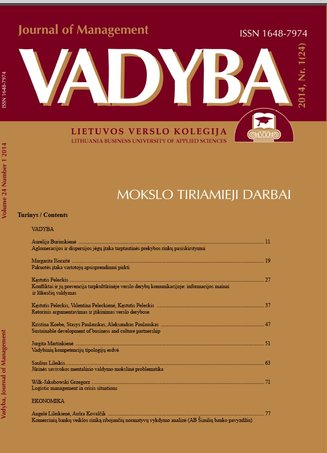AGREGUOTO INDEKSO TAIKYMAS FINANSŲ SISTEMOS STABILUMUI VERTINTI (LIETUVOS PAVYZDŽIU)
ASSESSMENT FINANCIAL SYSTEM STABILITY USING AGGREGATED INDICES (CASE OF LITHUANIA)
Author(s): Alina Pavlik, Lina NovickytėSubject(s): Economy
Published by: Lietuvos verslo kolegija
Keywords: Financial crisis; financial system stability; banking sector; financial stress index; aggregate index.
Summary/Abstract: Maintaining financial system stability has become very important at the country level as well as international level. Financial system stability is a broad concept and it refers to the smooth functioning of the key elements (institutions, markets and infrastructure, etc.) that make up the financial system. The role of authorities (central banks) responsible for promoting and maintaining financial stability involves monitoring financial developments, identifying areas of concern and undertaking necessary measures in cooperation with relevant institutions. Nowadays globalization and rapid integration of markets sometimes has negative consequences, when facilitating the dissemination of "contagion effect“ (or systematic risk). This effect is particularly dangerous in highly integrated markets; negative derivative of integration and contagion effect was especially apparent during the recent financial crisis, when the lack of confidence in the financial markets quickly spread to other markets and caused a lot of negative effects in the economy: banks collapsed, appeared liquidity problems in the financial system, the deterioration of expectations in financial markets, increasing public debt and etc. Therefore particularly important to assess the country's resilience to potential negative shocks and thus limit the potential contagion (systemic risk) spread in the market.
Journal: VADYBA
- Issue Year: 24/2014
- Issue No: 1
- Page Range: 113-120
- Page Count: 8
- Language: Lithuanian

